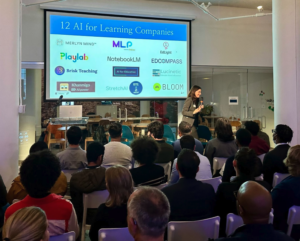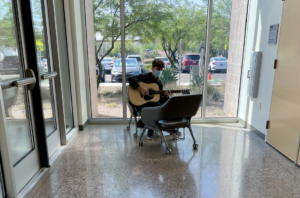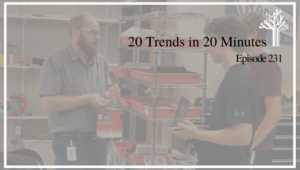Training Engineers to Spot Opportunity and Impact

The Kern Entrepreneurial Engineering Network (KEEN, @KEENunleashed) is a national partnership of universities with the shared mission to graduate engineers with an entrepreneurial mindset so they can go on to create more personal, economic, and societal value through a lifetime of meaningful work. This is an important mission, as the challenges that engineers face will continue to grow in complexity (and continue to involve more of the “human element”) as the world that they inhabit does the same.
KEEN partners include 43 institutions representing more than 5,100 faculty members who are educating almost 80,000 undergraduate engineering students.
“No one individual or institution alone can make the impact necessary to advance engineering education to reach students and faculty at a national scale,” states Ann McKenna, Professor of Engineering and Director of the Polytechnic School at Arizona State University.

Heather Dillon got involved because of the sense of purpose, she liked to have her students involved in impact projects like Thermodynamics in the Arts. The mechanical engineering professor at University of Portland participates to gain project ideas from across the network.
Kurt Paterson (below, @kurtpaterson) enjoys building on trusted relationships. As the head of the engineering department at Virginia’s James Madison University, he looks for ways to enhance their project-based curriculum.

JD Yoder appreciates the power of shared mission. As the Dean of Engineering at Ohio Northern University, he actively seeks entrepreneurial partnerships (shown below with Dr. Lawrence Neeley, Associate Professor of Design and Entrepreneurship at Olin College).
Heidi Neck (@ProfNeck) from Babson College (pictured in feature image) said equipping young people to face uncertainty was the new collective call to action. It includes EQ (the ability to socialize, empathize, and communicate), and includes what she calls Entrepreneurial Intelligence–the ability to create, navigate, and transcend.

What brings them together is the KEEN Framework of curiosity, connections, and creating value.

Unlike business schools, which often view entrepreneurship as a set of skills specific to starting a business, these engineering schools cultivate an impact-oriented mindset that could be deployed in a big company or social enterprise as well as a startup.
KEEN partners frame educational outcomes with an entrepreneurial mindset (see KEEN Framework). They train young people to spot opportunity and use design skills for impact.
A Network for Impact
Worcester Polytechnic Institute in central Massachusetts received one of the original KEEN grants a decade ago. About the collaboration, professor Glenn Gaudette sees “value for my university and value for my students.” He said it helps the faculty develop more engaging classes which boosts retention rates. The KEEN collaboration helps his faculty develop more innovative proposals, which bring in more research funding.
His own research is a great example. Gaudette is using spinach leaves to grow human heart cells. “That’s entrepreneurial mindset, that’s the 3C’s,” said Gaudette.
KEEN partners are leading a movement to incorporate the entrepreneurial mindset in undergraduate engineering programs throughout the U.S. Arizona State University integrates entrepreneurial minded learning into freshmen experiences. Rose-Hulman engages faculty to contribute and pilot initiatives for assessment and credentialing models. University of Dayton empowers faculty to infuse entrepreneurially minded learning into courses through a fellows program. Bucknell’s early work focused on institutional change.

A Community of Collaborators
Over 450 attendees from 93 universities attended the KEEN National Conference to learn more about entrepreneurially minded learning. The conference theme was entrepreneurial mindset at work (EM@Work). It focused on showcasing the power the entrepreneurial mindset has within academia, industry, and the future careers of engineering students. Most attendees are infusing entrepreneurially minded learning into existing programs, but some schools attended the conference to learn how to build an engineering program.
The conference had 40 different workshop offerings as well as plenary sessions and networking opportunities to provide attendees with new tools and ideas to implement on their campuses. Over a quarter of the attendees were faculty presenters who applied to lead a workshop or conference talk.
 A new platform, EngineeringUnleashed.com, connects partner schools and faculty and encourages resource sharing. Starting this summer, the platform will deliver expanded professional learning experiences.
A new platform, EngineeringUnleashed.com, connects partner schools and faculty and encourages resource sharing. Starting this summer, the platform will deliver expanded professional learning experiences.
Engineering leaders like Bucknell’s Charles Kim have a sense of what they want to see in class, and through KEEN, identified that what they are seeking is to foster an entrepreneurial mindset in their students. About the KEEN National Conference, Kim added, “I’m excited about what will happen in 20 years–that’s why I’m here.”
Educational networks are the most important learning innovation of the last 20 years (as we argue in our recent book Better Together). Networks like KEEN frame important learner goals and build platforms and collaboration opportunities to support those important outcomes. KEEN is changing engineering education and, in doing so, improving lives.
For more, see:
- Teaching Innovation and Entrepreneurship to Fuel 21st Century Success
- Learn to Earn: The Entrepreneurship Education Landscape
The last two photos by Madelinne Grey Photography. The others were taken by the author.
Stay in-the-know with innovations in learning by signing up for the weekly Smart Update. This post includes mentions of a Getting Smart partner. For a full list of partners, affiliate organizations and all other disclosures, please see our Partner page.








0 Comments
Leave a Comment
Your email address will not be published. All fields are required.